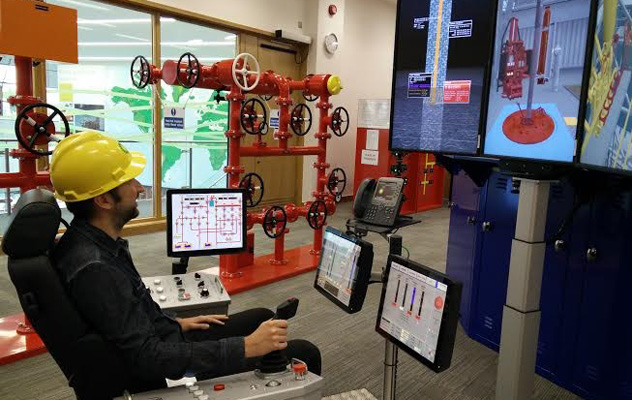
In July 2015, after teaching had finished, I was lucky enough to take part in the STEM Insight scheme, Insight into industry, run by the National STEM Learning Centre and Network.
Insight into industry aims to give teachers some time (two weeks in my case) to immerse themselves in the day-to-day life of some of the country’s most well-known industrial organisations. It is open to teachers of science, technology, engineering, mathematics and computing, and partners include Crossrail, IBM, Thames Water and many more. I applied for the placement with BP.
What did I hope to get out of the placement?
Firstly, I wanted to improve my knowledge of science, technology, engineering and mathematics (STEM) careers. I run environmental studies at A level but my background is in biochemistry, so I was very keen to gain extra understanding of what is out there for my students after college. The oil and gas industry has immense environmental impacts and, especially in light of events in 2010, BP is particularly keen to mitigate these. Students are exposed to a wide variety of career case studies on a course as diverse as mine, but some don’t think beyond a life spent researching creatures that live in the sea, as admirable as that is! Being able to tell them more about the industrial importance of having environmental scientists is so important (and, after all, most do work in industry); there are generally great salaries to be had as well.
Secondly, I wished to improve my subject knowledge. My course includes a whole section on fossil fuels at A2 and an opportunity to see the technology first-hand really appealed.
Finally, I wanted to develop a long-term link with BP to provide our students with opportunities for work experience, visits and perhaps speakers to come in and talk. Often the key difficulty is getting the right email address.
What did I get out of the placement?
The range of careers available at BP is really quite extraordinary. We (I was with two other teachers, both from London academies) met people who worked in shipping, geology, ecology, refining, lubricant design, sub-sea hardware, site management, trading, professional training, IT – the list was endless. We spent time at their main site at Sunbury, as well at the oil trading floor in Docklands and the Castrol site at Pangbourne. I certainly got to improve my subject knowledge, or at least see it in action. What unified all the staff was an unceasing desire to do their best and be the best. BP employees displayed excellent communication skills and were genuinely passionate about what they did. Most were from Russell Group universities and we were given an insight in the recruitment process. One common criticism of their applicants was “tell me less about what “we” did and more about what “I” did”; a lesson for us all. In addition, a large proportion of their new recruits had taken part in vacation work experience schemes with BP prior to their full-time job offer. I think our students really should be thinking about getting these arranged as soon as possible when starting at university, Law being another specific career path that springs to mind.
Other common themes of the visit were:
- many people ended up doing jobs that had nothing to do with their degree, especially in the more administrative roles…
- …but having a degree is important. The only real career pathway for those without a degree was to be a shipping cadet – a very exciting one though!
- many engineers spent a great deal of time using their data handling skills (e.g. making complex spreadsheets to solve problems) rather than “building stuff” per se; their numeracy is valued, opening up other professions like banking/management consultancy/accounting
- the UK has a huge shortage of people who can code computers
- safety is taken very seriously, as is teamwork
- many jobs allow you to travel
- BP have excellent catering
BP invest greatly in science education – my visit was funded by Project ENTHUSE, which BP do contribute to. Whilst I was there, BP were involved in a symposium with other blue-chip companies about how to encourage more young people to consider STEM careers. We, as teachers, were invited along to give our views. There was a common feeling that whilst most STEM teachers would recommend STEM careers, a large proportion had quite limited knowledge of what industrial STEM careers (which often pay the biggest salaries) actually involve.
What next?
I have many case studies, anecdotes and some photos (industrial secrecy) to relay to my students. Working at a place like BP is highly competitive and attracts the best of the best. Not everyone can work for a company such as this, but the weeks did teach me more in general about jobs that apply science, as engineering does.
I did get my work experience contact at BP and have provided this to STEM colleagues at college. Suffice it to say that it is very competitive and spaces are limited, but I already know one of my students has applied. I am looking at the possibility of visits/speakers for next summer, when we actually teach fossil fuels in Environmental Studies. BP already do much outreach with schools, often arranged via the professional engineering bodies. Finally, in December 2015, I attended a meeting in York designed for all the UK’s STEM Insight teachers to meet up and compare experiences. Please do not hesitate to contact me if you would like to know more about the scheme.
Special thanks to the College for letting me have time out of work, Gemma Taylor at the National STEM Learning Centre and Network, Moira Farley at BP, Project ENTHUSE and my teacher colleagues who made it such an enjoyable experience.

